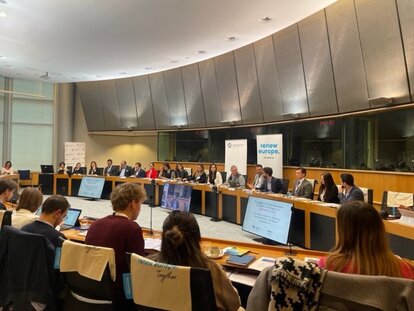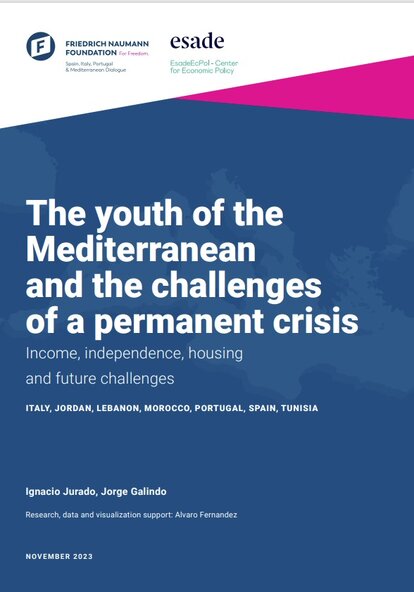YOUTH
Youth in the Mediterranean at the heart of the debate in the European Parliament

Moments of the debate with Eva-Maria Poptcheva, MEP elected in Spain and Vice-Chair Committee on Economic and Monetary Affairs and Salima Yenbou, MEP elected in France and Member of the Delegation to the Parliamentary Assembly of the Union for the Mediterranean.
© FNF MadridLast week, FNF Madrid and ESADE EcPol, in cooperation with Renew Europe, presented in the European Parliament the report: “The Youth of the Mediterranean and the Challenges of a permanent crisis: Income, independence, housing, and future challenges”. The cross-regional survey generates primary research and extensive first-hand data on the situation of different young people in Jordan, Lebanon, Italy, Morocco, Portugal, Spain, and Tunisia.
The event brought together Members of the European Parliament (MEPs), partners, experts, and youth organizations to debate the results with around 50 participants.
Introductory remarks were given by Laia Garrido, Policy Advisor with Renew Europe, Jules Maaten, Head of the European Dialogue regional office in Brussels with FNF, and David Henneberger, Head of FNF Madrid. They all underlined the liberal commitment to equal opportunities for all and to an eye-level dialogue in the Mediterranean.

Participants of the debate Youth in the Mediterranean in the European Parliament.
© FNF MadridHouse, income and emancipation
Jorge Galindo, Deputy Director of EsadeEcPol and co-author of the study, delved into key data on income, housing, emancipation, and future expectations for young people in the Mediterranean.
What are the Mediterranean youth‘s perspectives towards its future? How do they see their countries’ future and key challenges ahead? The answers to these questions were the preamble for what the co-author considered the three policy areas that should be addressed:
- Investing in human capital. Expansion and access to university education, equitable education and a professional orientation aligned with labor market demands.
- Establishing an economic safety net for young people from families with limited resources through minimum benefits and notional savings accounts.
- Improving housing access by increasing public financing and encouraging public-private partnerships to meet the housing needs of young people.
“Permanent solutions for a permanent crisis”
Following the report presentation, Eva-Maria Poptcheva, MEP from Spain and Vice-Chair of the Committee on Economic and Monetary Affairs and Salima Yenbou, MEP from France and Member of the Delegation to the Parliamentary Assembly of the Union for the Mediterranean, had a lively debate on the policy recommendations with the participants.
MEP Yenbou emphasized the need to reinforce the educational sector, seeing it as a crucial component in ensuring prosperity for young people in the Mediterranean. Yenbou spoke about the urgent necessity to establish "permanent solutions for a permanent crisis," which would serve as the cornerstone of a long-term plan to enhance the lives of young people.
MEP Poptcheva stated during the discussion that when it comes to the youth, policymakers should be concentrating on three fundamental areas: housing, income, and pensions. Poptcheva noted that understanding the relationship between housing and income is essential to understanding the current issues faced by young people and this relationship is one of their largest challenges.
Following the expert roundtable and report presentation, attendees moved on to a lunch debate, where Dragoş Pîslaru, the Chair of the European Parliament's Committee on Employment and Social Affairs, gave the keynote address. Pîslaru highlighted the critical role that socioeconomic initiatives and inclusive policies have in addressing the needs of youth around the Mediterranean.

“The Youth of the Mediterranean and the Challenges of a permanent crisis: Income, independence, housing, and future challenges”.
© FNF MadridDownload the Publication
About the publication
The publication "Young People Facing the Permanent Crisis: Expectations, Preferences, and Attitudes towards Socio-Economic Realities" is a joint endeavor of the FNF Madrid office and its partner EsadeEcPol, aims to shed light on the unique challenges and opportunities facing young individuals in Mediterranean countries.
The comprehensive study spans across Spain, Italy, Jordan, Lebanon, Morocco, Portugal, and Tunisia, providing valuable insights into the socio-economic attitudes. By delving into their expectations and preferences, we aim to gain a deeper understanding of how young people navigate through the complexities of a perpetually evolving landscape.
The transition to adulthood for those born between 1980 and 2005 has been profoundly impacted by recurrent economic and social crises, particularly affecting young individuals in Southern Europe and the broader Mediterranean region.
